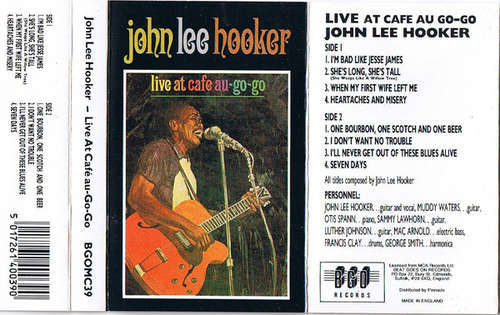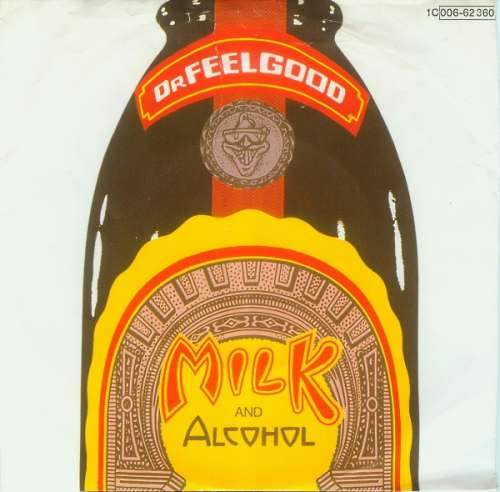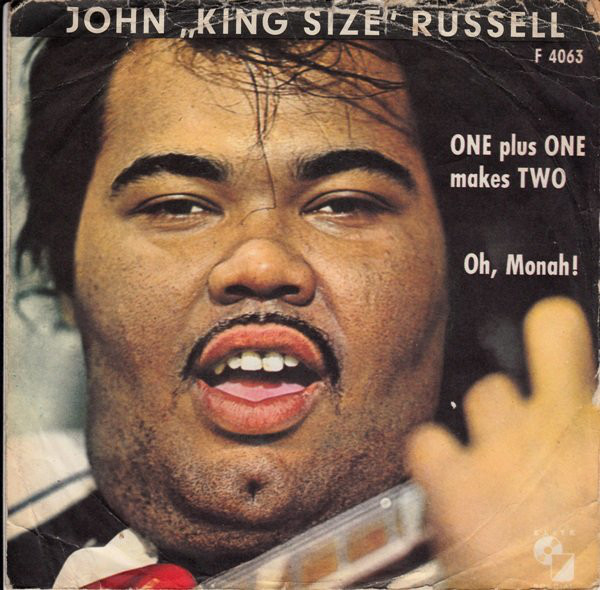John Lee Hooker - Live At Cafe Au-Go-Go (Cass, Album, RE)
Vinyl Schallplatten Ankauf - Verkauf
Tracklist
Informationen
Text from inside cover:
Live At Cafe Au-Go-Go
John Lee Hooker and Otis Spann are a formidable blues team, and when they appared at the Café au Go-Go in Greenwich Village during August, 1966, the room was jammed more often than not.
It was jammed with young people who sat in ranks before them while consuming enormous vases of ice cream and soda. These customers were informally but sensibly dressed. Some wore no shoes. They sat quietly, attentively, and appreciatively.
This was the new, youthful audience the blues have attracted, unexpectedly and perhaps against the laws of logic. It is a triumph for the blues and a triumph of the 1960s.
The audience deserves to be congratulated, too, because it has found its way to one of the most vital, valid and vigorous forms of American music. It has found it with very little help, because rarely if ever is a genuine blues singer presented on national TV or any of the other mass media TV happily presents the imitations, domestic and foreign, because it has its own prejudices and its own monoric conception of youth's intelligence, but here is one instance where youth has proved it wrong.
The situation is interesting. As young people grow out of their teens, the infantile banalities of rock 'n ' roll cease to satisfy. But the chilly pretensions and ugly postures of "Modern" and "avant-garde" jazz do not appeal to them either. They are looking for realism in music, for an earthy emotionalism that relates to the world they are discovering. Some of them see through the pseudofolk who sing folksongs learned out of a book, and they are not deluded by the stance and jargon of the folklorist. Some of them find what they want in the blues and this is remarkable two-thirds of the way through the twentieth century, when all the signposts point the other way.
Besides those who merely want to enjoy them, others have found the blues. There are the snobs who need to intellectualize and make a science of appreciation. At a previous record session, John Lee Hooker had said, "I know what they like in these coffee houses". This was coldly received in certain quarters. Authenticity presumably demanded that the music continue to be played only in plantation halls, juke joints, and bars on Chicago's South Side. If coffee houses automatically implied concessions and commercialism to the hyper-critical, there was no evidence a the Café au Go-Go that this was justified.
John Lee leaned at the mike, solemn, severe and a little stooped. Muddy Waters, Sammy Lawhorn, Luther Johnson and Mac Arnold stood in a line behind him, deadpan, bending with the beat. Otis Spann sat facing him at the piano, his back to the audience. Francis Clay was intent on the rhythmic foundation, and George Smith, who had previously worked with Muddy in 1955, had his mouth-harp ready to add keening cries and wailing embellishments as the opportunity offered. They were as informally dressed as their audience, and although they were "playing for the people", it was without showmanship, almost as though they were playing for themselves.
Backstage, John Lee had sat quietly, strumming on "his wife" as he calls his six-string guitar. The younger man had joined him on by one, first Sammy Lawhorn, then Mac Arnold, and then "Georgia Boy" Johnson. "Get it right, get it rights!" he had muttered - a teacher with pupils - as they played along.
After the Muddy Waters band had completed the first part of the set, Muddy introduced him with warm generosity, referring to him as "a killer" and "the champ". John Lee's long, thin foot began to tap out the time, his guitar chords established his characteristic drop beat, and the band swung in behing him.
The record opens with I'm Bad Like Jesse James, a dramatic tour de force which reveals the other side of the blues coin retribution for the untrustworthy and indiscreet friend, right down to the bubbling gurgles as he is downed, bound, in the river. The guitars toll doomfully here, too. John Lee sang this one with utter seriousness, a grim expression on his face allthrough, but when he had finished he swung around to Muddy Waters with a big smile.
She's Long, she's Tall is comparatively joyful, the lady's ability to weep like a willow tree evidently being a secondary consideration. When My First Wife Left Me, as John Lee announces afterwards, is "real blues", sorrowing, reflective and philosophical.
"I'm going to say in soulville for a little while", he says, before going into Heartaches and Misery. And the lyrics of this one contain a very appropriate envoi: "Singing for the people who feel the same way I do".
After all, how old do you have to be to get the blues - in 1966 or any other year?
"One Bourbon, One Scotch and One Beer" isn't the happy drinking song the title suggests. The remorseless beat, the walking tempo (very good for dancing, incidentally), John Lee's relatively unimpassioned delivery together evoke a bitter bar-room picture of someone deliberately drinking to drive the blues away. The slower, wearily resigned "I Don't Want No Trouble" is an excellent example of the effectiveness of the Hooker back beat. Even at this tempo it is mesmeric and infectious, and Otis Spann's brilliant piano accompaniment adds an important dimension. "I'll Never Get Out Of These Blues Alive" is even sadder as the tolling guitars imply man's inevitable fate. "Seven Days" is similarly despairing, but here is hope that the singer's predicament is only temporary.
- Stanley Dance
℗ 1967
Made in England.
Labels
- BGO Records
Artist s
- Muddy Waters
- John Lee Hooker
- Bob Thiele
- Otis Spann
- Francis Clay
- Sammy Lawhorn
- Luther Johnson
- George Smith (4)
- Mac Arnold
- Stanley Dance
- Henry Epstein
- Byron Goto
Zusätzliche Informationen
Die auf dieser Seite aufgeführte Vinyl Schallplatte bzw. CD können sie (sofern noch nicht verkauft) online in unserem Schallplatten Shop bestellen , indem sie den Button (in den Warenkorb) klicken. Unsere Schallplattenpakete finden sie in unserem Ebay Shop.
Vinyl Suchservice – Profitieren sie von unserem Know How und unsererm weltweiten Netzwerk von Plattenhändlern. Falls die von ihnen gesuchte Schallplatte gerade nicht in unserem Shop verfügbar ist, senden sie uns eine Email mit der Angabe des Interpreten, des Titels, der Katalognummer und weiteren Angaben. Wir versuchen dann, die Schallplatte für sie zu finden und machen ihnen ein unverbindliches Angebot. Noten und Songtexte finden sie hier: Notenbuch.de
Wichtige Hinweise:
Bei den Coverfotos handelt es sich um Beispielbilder (All product images are available under CC0 „No Rights Reserved“ license), den tatsächlichen Zustand des Covers, sowie des Vinyls können sie anhand der Zustandsbeschreibung (Media/Sleeve Condition) und der Kommentare ermitteln. Eine Erklärung der Abkürzungen finden sie in unserem Glossar.
Zahlungsmöglichkeiten in unserem Schallplatten Shop: Vorkasse per Überweisung oder Paypal.
Bitte beachten Sie auch unsere anderen Angebote, um Versandkosten zu sparen (innerhalb Deutschlands zahlen sie maximal EUR 6,- – egal, wie viele Platten oder CDs im Paket sind).
Der Schallplattenversand erfolgt über die Deutsche Post bzw. DHL. Zur Versandkostentabelle.
Der Artikel wird nach § 25 A USTG (Differenzbesteuerung) besteuert. Sie zahlen den Gebotsbetrag zzgl. der Versandkosten.
Hinsichtlich der von uns erstmals mit Ware befüllten und an private Endverbraucher abgegebene Verkaufsverpackungen hat sich unser Unternehmen zur Sicherstellung der Erfüllung unserer gesetzlichen Pflichten nach § 6 VerpackV dem bundesweit tätigen Rücknahmesystem der Landbell AG, Mainz (Kundennummer: 4127521) angeschlossen.
Allgemeine Geschäftsbedingungen
Hinweis zur GPSR ( EU-Produktsicherheitsverordnung)
Risikoanalyse für die Nutzung von gebrauchten Tonträgern (wie Vinylschallplatten, CDs, Kassetten etc.) betrachtet die potenziellen Gefährdungen, die sowohl für die Benutzer als auch für die Umwelt auftreten können. Die Analyse bezieht sich auf die physische Nutzung, mögliche Gesundheitsrisiken und Auswirkungen auf die Qualität der Tonträger. Auch rechtliche Aspekte (z. B. Urheberrecht) und die Handhabung bei der Entsorgung werden berücksichtigt. Die Analyse wird durch konkrete Handlungsempfehlungen ergänzt.
1. Gefährdungsbeurteilung (Identifikation von Risiken)
a) Gesundheitsrisiken für den Benutzer
Gefährdung durch Schimmel oder Pilzbefall (bei Schallplatten und Kassetten)
Risikobeschreibung: Wenn gebrauchte Tonträger unsachgemäß gelagert werden, können sie Schimmel oder Pilzen ausgesetzt sein, die sich auf der Oberfläche ablagern. Dies ist besonders bei Vinylplatten und Kassetten mit empfindlicheren Materialien der Fall.
Mögliche Auswirkungen: Gesundheitsschäden durch Einatmen von Schimmelsporen, Hautkontakt mit Pilzen.
Maßnahmen: Überprüfung auf Schimmel oder Pilzbefall vor dem Gebrauch. Schallplatten und Kassetten regelmäßig reinigen und in trockenen, gut belüfteten Umgebungen lagern.
Gefährdung durch hohe Lautstärke
Risikobeschreibung: Die Verwendung von Schallplatten in Verbindung mit leistungsstarken Lautsprechern bei hohen Lautstärken kann zu Hörschäden führen.
Mögliche Auswirkungen: Gehörschäden bei zu langem oder wiederholtem Hören bei hohen Lautstärken.
Maßnahmen: Aufklärung über sichere Lautstärkewerte, Verwendung von Lautstärkebegrenzern oder sicheren Kopfhörern.
Gefährdung durch Staub und Schmutz
Risikobeschreibung: Staub und Schmutz, die sich auf gebrauchten Tonträgern ablagern, können bei der Wiedergabe für den Benutzer gesundheitsschädlich sein, insbesondere wenn diese Partikel in die Luft gelangen.
Mögliche Auswirkungen: Atemwegsprobleme, allergische Reaktionen.
Maßnahmen: Reinigung der Tonträger vor der Nutzung. Einsatz von Anti-Staub- und Reinigungsbürsten.
Gefährdung durch beschädigte oder schadhafte Tonträger (Risse, Kratzer)
Risikobeschreibung: Kratzer oder Risse auf Vinylplatten oder CDs/Kassetten können die Wiedergabequalität beeinträchtigen und möglicherweise die Geräte beschädigen (z. B. Plattenspieler-Nadel).
Mögliche Auswirkungen: Hörprobleme, Zerstörung der Nadel des Plattenspielers, mögliche Verletzungsgefahr durch scharfe Kanten.
Maßnahmen: Überprüfung der Tonträger auf Schäden vor dem Gebrauch, vorsichtige Handhabung und Lagerung.
b) Technische Risiken
Gefährdung durch defekte Geräte (Plattenspieler, CD-Player, Kassettendecks)
Risikobeschreibung: Gebrauchte Tonträger können in Verbindung mit alten oder defekten Wiedergabegeräten verwendet werden, die die Qualität der Wiedergabe beeinträchtigen oder Schäden verursachen können.
Mögliche Auswirkungen: Störungen in der Audiowiedergabe, mechanische Beschädigung der Tonträger.
Maßnahmen: Regelmäßige Wartung und Pflege von Wiedergabegeräten, Testen der Funktionstüchtigkeit vor Gebrauch.
Gefährdung durch falsche Handhabung oder Abspielgeschwindigkeit
Risikobeschreibung: Die Nutzung von Tonträgern auf falschen Wiedergabegeräten (z. B. einer Schallplatte auf einem nicht geeigneten Plattenspieler) oder mit falscher Geschwindigkeit kann zu Schäden führen.
Mögliche Auswirkungen: Verzerrungen, Beschädigung der Nadel oder des Tonarms bei Schallplatten.
Maßnahmen: Überprüfen, ob das Wiedergabegerät und die Tonträger miteinander kompatibel sind.
c) Rechtliche und urheberrechtliche Risiken
Gefährdung durch Urheberrechtsverletzungen
Risikobeschreibung: Beim Abspielen von gebrauchten Tonträgern besteht das Risiko, dass urheberrechtlich geschützte Musik ohne Genehmigung verbreitet oder kommerziell genutzt wird.
Mögliche Auswirkungen: Rechtsstreitigkeiten, Schadenersatzforderungen.
Maßnahmen: Sicherstellen, dass der gebrauchte Tonträger nicht illegal kopiert oder verkauft wurde, und die Nutzung auf legale Weise erfolgt.
d) Umwelt- und Entsorgungsrisiken
Gefährdung durch unsachgemäße Entsorgung (Müll, Umweltbelastung)
Risikobeschreibung: Gebrauchte Tonträger werden oft unsachgemäß entsorgt, was zu einer Umweltbelastung führen kann. Besonders bei Vinylplatten, die PVC (Polyvinylchlorid) enthalten, ist die Entsorgung problematisch.
Mögliche Auswirkungen: Umweltverschmutzung, Giftstoffe im Boden oder Wasser.
Maßnahmen: Förderung des Recyclings von gebrauchten Tonträgern, richtige Entsorgung über Wertstoffhöhlen oder Recyclingprogramme.
2. Potenzialanalyse (Bewertung der Risiken)
a) Gesundheitsrisiken
Wahrscheinlichkeit: Mittel bis hoch (abhängig von der Lagerung und Handhabung der gebrauchten Tonträger).
Schwere: Mittel (beeinträchtigt die Gesundheit des Benutzers kurzfristig, langfristig jedoch eher gering).
Maßnahmen: Regelmäßige Reinigung und Überprüfung auf Schadstoffe, korrekte Lagerung der Tonträger.
b) Technische Risiken
Wahrscheinlichkeit: Mittel (bei älteren oder schlecht gewarteten Geräten und Tonträgern).
Schwere: Mittel bis hoch (geringfügige Schäden an der Nadel oder dem Gerät, schwere Schäden an den Tonträgern sind ebenfalls möglich).
Maßnahmen: Regelmäßige Wartung und sorgfältiger Umgang mit Tonträgern und Geräten.
c) Rechtliche Risiken
Wahrscheinlichkeit: Niedrig (insbesondere, wenn gebrauchte Tonträger nicht kommerziell genutzt werden).
Schwere: Hoch (im Falle von Urheberrechtsverletzungen können hohe Strafen oder Schadensersatzforderungen anfallen).
Maßnahmen: Überprüfen der rechtlichen Herkunft der gebrauchten Tonträger, keine unerlaubte Vervielfältigung oder kommerzielle Nutzung.
d) Umwelt- und Entsorgungsrisiken
Wahrscheinlichkeit: Mittel bis hoch (bei unsachgemäßer Entsorgung durch Endverbraucher).
Schwere: Hoch (umweltbelastende Auswirkungen durch PVC und andere Kunststoffbestandteile).
Maßnahmen: Förderung von Recycling und Aufklärung über umweltgerechte Entsorgung.
3. Handlungsempfehlungen
a) Für den Gebrauch von gebrauchten Tonträgern
Sorgfältige Prüfung vor Nutzung: Vor dem Abspielen von gebrauchten Tonträgern sollten diese auf sichtbare Schäden, wie Kratzer, Risse oder Schimmel, überprüft werden.
Bei Schallplatten empfiehlt sich eine Reinigung mit speziellen Bürsten und Reinigungsmitteln.
Für Kassetten und CDs sollten Staub und Schmutz entfernt werden, um eine optimale Wiedergabe zu gewährleisten.
Schutz der Gesundheit:
Vor dem Hören sollte der Raum gut gelüftet werden, besonders wenn gebrauchte Tonträger aus zweiter Hand stammen und möglicherweise Schimmelsporen enthalten können.
Staubfilter für Plattenspieler oder Kassettenrekorder können ebenfalls hilfreich sein, um Staubansammlungen zu minimieren.
Verwendung geeigneter Geräte:
Prüfen Sie, ob Ihr Wiedergabegerät (Plattenspieler, CD-Player, etc.) in gutem Zustand ist und zu den Tonträgern passt (richtige Nadel, richtige Geschwindigkeit).
Geräte regelmäßig warten, insbesondere Nadel und Tonarm bei Plattenspielern.
b) Für die rechtliche Nutzung
Überprüfung der Herkunft: Achten Sie darauf, dass gebrauchte Tonträger nicht illegal kopiert oder verkauft wurden, um Urheberrechtsverletzungen zu vermeiden.
Vermeiden der kommerziellen Nutzung: Das Abspielen von Musik aus gebrauchten Tonträgern zu kommerziellen Zwecken, ohne entsprechende Lizenzen oder Genehmigungen, kann zu rechtlichen Problemen führen.
c) Für die Entsorgung
Richtige Entsorgung von Tonträgern: Gebrauchte Tonträger, die nicht mehr funktionstüchtig sind, sollten korrekt über Recyclingprogramme entsorgt werden.
Förderung von Recycling: Unterstützen Sie Recyclinginitiativen für Vinylplatten und andere Tonträgermaterialien, um die Umweltbelastung zu minimieren.
4. Zusammenfassung
Die Nutzung von gebrauchten Tonträgern birgt sowohl gesundheitliche als auch technische Risiken. Durch sorgfältige Prüfung, richtige Handhabung und Pflege sowie die Beachtung von Umwelt- und Rechtsvorschriften lassen sich viele dieser Risiken minimieren. Es wird empfohlen, Tonträger vor der Nutzung gründlich zu überprüfen, bei der Entsorgung auf Recycling zu setzen und sich der rechtlichen Implikationen der Nutzung bewusst zu sein.




